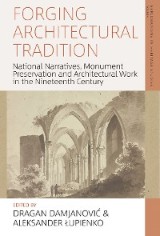Details

Forging Architectural Tradition
National Narratives, Monument Preservation and Architectural Work in the Nineteenth CenturyExplorations in Heritage Studies, Band 4 1. Aufl.
|
48,99 € |
|
| Verlag: | Berghahn Books |
| Format: | |
| Veröffentl.: | 11.03.2022 |
| ISBN/EAN: | 9781800733381 |
| Sprache: | englisch |
| Anzahl Seiten: | 366 |
DRM-geschütztes eBook, Sie benötigen z.B. Adobe Digital Editions und eine Adobe ID zum Lesen.
Beschreibungen
<p> During the nineteenth century, a change developed in the way architectural objects from the distant past were viewed by contemporaries. Such edifices, be they churches, castles, chapels or various other buildings, were not only admired for their aesthetic values, but also for the role they played in ancient times, and their role as reminders of important events from the national past. Architectural heritage often was (and still is) an important element of nation building. Authors address the process of building national myths around certain architectural objects. National narratives are questioned, as is the position architectural heritage played in the nineteenth and the early twentieth centuries.</p>
<p> List of Figures and Tables</p>
<p> <a><strong>Introduction:</strong></a> Forging Architectural Tradition<br> <em>Aleksander Łupienko </em></p>
<p> <strong>Part I: Architectural Conservation and National Narratives </strong></p>
<p> <strong>Chapter 1.</strong> The Cathedral of Citizenship: Race and National Identity in Eugène Viollet-le-Duc’s Work and Discourse<br> <em>Bérénice Gaussuin </em></p>
<p> <strong>Chapter 2.</strong> Identity Written in Stone?: Gothicising Renovation of Estonian Churches at a Second Glance<br> <em> Kristina Jõekalda </em></p>
<p> <strong>Chapter 3.</strong> Architecture as a Weapon: The Gothic and the National Ideal in Nineteenth-Century Polish Discourse<br> <em>Aleksander Łupienko </em></p>
<p> <strong>Chapter 4.</strong> Before and After Emile-André Lecomte du Nouÿ or the Birth of National Style in Romanian Architecture<br> <em>Anda-Lucia Spânu</em></p>
<p> <strong>Chapter 5.</strong> On the Articulation and Popularization of Christian Built Heritage: Representing National Continuity in Nineteenth-Century Athens<br> <em>Georgios Karatzas</em></p>
<p> <strong>Part II: Styles for the Nation and State</strong></p>
<p> <strong> Chapter 6.</strong> Creating a Monument to Kaiser Wilhelm I in Berlin: Tensions between National, Prussian and Dynastic Identities<br> <em>Douglas Klahr</em></p>
<p> <strong>Chapter 7.</strong> History, National Identity and Architecture in the Last Royal Palaces in Europe (1861–1930): Turin, Budapest, Bucharest<br> <em>Paolo Cornaglia </em></p>
<p> <strong>Chapter 8 .</strong> Renaissance Architecture and the Search for the Hungarian National Style in the Late Nineteenth and Early Twentieth Centuries <br> <em>Gábor György Papp</em></p>
<p> <strong>Chapter 9.</strong> Vernacular Versus Historical: National Style(s) in the Architecture of Austro-Hungarian Croatia<br> <em>Dragan Damjanović </em></p>
<p> <strong>Part III: Appropriation of Heritage(s) </strong></p>
<p> <strong>Chapter 10.</strong> Architectural Heritage in the National Discourse of the Nineteenth Century Russia: Kazan Antiquities<br> <em>Gulchachak Nugmanova</em></p>
<p> <strong> Chapter 11.</strong> Hungarian Nation-Building and the Use of Medieval Archaeology: Interpreting the Székesfehérvár Excavations in the Nineteenth Century<br> <em>Andrea Kocsis</em></p>
<p> <strong>Chapter 12.</strong> Architectural Heritage of Silesia in the Purview of Prussian History (1740–1918)<br> <em>Monika Ewa Adamska </em></p>
<p> <strong>Chapter 13.</strong> Madonna del Pascolo: Ruthenian Heritage in the Baroque Rome and the Development of the National Church of the Ukrainians, 1640s‒1960s<br> <em>Anatole Upart</em></p>
<p> <strong>Afterword:</strong> For the Glory of Nation: Architectural Heritage in Nineteenth-Century Europe<br> <em>Dragan Damjanović</em></p>
<p> Index</p>
<p> <a><strong>Introduction:</strong></a> Forging Architectural Tradition<br> <em>Aleksander Łupienko </em></p>
<p> <strong>Part I: Architectural Conservation and National Narratives </strong></p>
<p> <strong>Chapter 1.</strong> The Cathedral of Citizenship: Race and National Identity in Eugène Viollet-le-Duc’s Work and Discourse<br> <em>Bérénice Gaussuin </em></p>
<p> <strong>Chapter 2.</strong> Identity Written in Stone?: Gothicising Renovation of Estonian Churches at a Second Glance<br> <em> Kristina Jõekalda </em></p>
<p> <strong>Chapter 3.</strong> Architecture as a Weapon: The Gothic and the National Ideal in Nineteenth-Century Polish Discourse<br> <em>Aleksander Łupienko </em></p>
<p> <strong>Chapter 4.</strong> Before and After Emile-André Lecomte du Nouÿ or the Birth of National Style in Romanian Architecture<br> <em>Anda-Lucia Spânu</em></p>
<p> <strong>Chapter 5.</strong> On the Articulation and Popularization of Christian Built Heritage: Representing National Continuity in Nineteenth-Century Athens<br> <em>Georgios Karatzas</em></p>
<p> <strong>Part II: Styles for the Nation and State</strong></p>
<p> <strong> Chapter 6.</strong> Creating a Monument to Kaiser Wilhelm I in Berlin: Tensions between National, Prussian and Dynastic Identities<br> <em>Douglas Klahr</em></p>
<p> <strong>Chapter 7.</strong> History, National Identity and Architecture in the Last Royal Palaces in Europe (1861–1930): Turin, Budapest, Bucharest<br> <em>Paolo Cornaglia </em></p>
<p> <strong>Chapter 8 .</strong> Renaissance Architecture and the Search for the Hungarian National Style in the Late Nineteenth and Early Twentieth Centuries <br> <em>Gábor György Papp</em></p>
<p> <strong>Chapter 9.</strong> Vernacular Versus Historical: National Style(s) in the Architecture of Austro-Hungarian Croatia<br> <em>Dragan Damjanović </em></p>
<p> <strong>Part III: Appropriation of Heritage(s) </strong></p>
<p> <strong>Chapter 10.</strong> Architectural Heritage in the National Discourse of the Nineteenth Century Russia: Kazan Antiquities<br> <em>Gulchachak Nugmanova</em></p>
<p> <strong> Chapter 11.</strong> Hungarian Nation-Building and the Use of Medieval Archaeology: Interpreting the Székesfehérvár Excavations in the Nineteenth Century<br> <em>Andrea Kocsis</em></p>
<p> <strong>Chapter 12.</strong> Architectural Heritage of Silesia in the Purview of Prussian History (1740–1918)<br> <em>Monika Ewa Adamska </em></p>
<p> <strong>Chapter 13.</strong> Madonna del Pascolo: Ruthenian Heritage in the Baroque Rome and the Development of the National Church of the Ukrainians, 1640s‒1960s<br> <em>Anatole Upart</em></p>
<p> <strong>Afterword:</strong> For the Glory of Nation: Architectural Heritage in Nineteenth-Century Europe<br> <em>Dragan Damjanović</em></p>
<p> Index</p>
<p> <strong>Aleksander Łupienko</strong> is assistant professor at the Institute of History, Polish Academy of Sciences in Warsaw. His research interests include cultural history of urban space in Central and East-Central Europe; private and public space; conservation movement and the history of Warsaw and Lviv in the nineteenth century.</p>

















